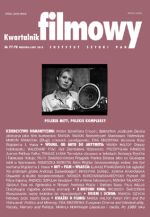Blask męskiego związku."Ziemia obiecana" Andrzeja Wajdy jako film kumpelski
The Radiance of the Masculine Relationship. Andrzej Wajda’s "Promised Land" as a Buddy Film
Author(s): Sebastian JagielskiSubject(s): Theatre, Dance, Performing Arts
Published by: Instytut Sztuki Polskiej Akademii Nauk
Keywords: Wajda; Andrzej;" Promised Land"; Polish cinema; history of film; homosexuality; buddy films.
Summary/Abstract: One of the dominant themes in the work of Andrzej Wajda is the male homo-social desire. In the Promised Land it takes on a particularly dangerous form. Placing homosexuality (or more broadly – sexual minority) within a context of tolerant and accepting male community does not fit into accepted narrative of the nation, within which gays are always presented as enemies. Although in the film the ideal body of a Pole is contrasted with the anti-body of a homosexual Jew, the relations between them are not shaped according to the national, anti-gay script. Multicultural male homo-community is an alternative to family life and nation-state identity. In Wajda’s film the weaning patriotic ethos clashes with the emerging, future oriented community. The analysis of the male homo-social community is preceded by a presentation and analysis of the American sub-genre of buddy films of the 1970s, to which Wajda directly refers.
Journal: Kwartalnik Filmowy
- Issue Year: 2012
- Issue No: 77-78
- Page Range: 25-54
- Page Count: 30
- Language: Polish

